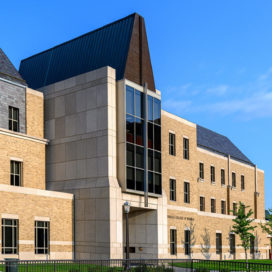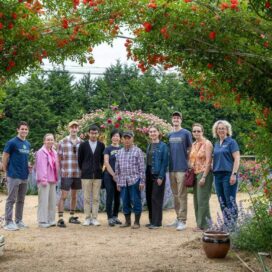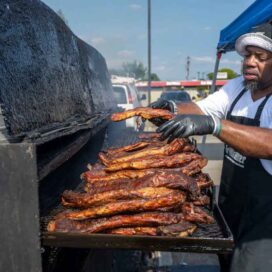Mendoza Dean Martijn Cremers delivers the 2019 undergraduate commencement speech
Published: May 21, 2019 / Author: Carol Elliott
On Sunday, May 19, 2019 Mendoza’s undergraduate class heard from Mendoza Dean Martijn Cremers and fellow speaker Peggy Noonan, speechwriter for President Ronald Reagan, Pulitzer Prize-winning columnist for the Wall Street Journal and author of five New York Times best-sellers.
Watch the diploma ceremony here or read a transcript of Dean Cremers’ speech below.
Congratulations to the class of 2019!
”Challenging The Great Wave”
Word Count: 1,800
Delivery of Speech: ~15 minutes
INTRODUCTION
Thank you, Ken, for that introduction.
Good afternoon. On behalf of the faculty and staff of the Mendoza College of Business, I am pleased to welcome you to the 2019 Mendoza College of Business Undergraduate Diploma Ceremony.
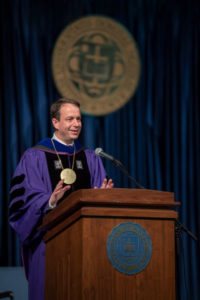 My name is Martijn Cremers, and I serve as the Dean of Mendoza.
My name is Martijn Cremers, and I serve as the Dean of Mendoza.
This is a special occasion — for our graduates, of course, for your families, and also for me. It’s my first time presiding over this ceremony.
And lucky me, I get to follow commencement speaker Peggy Noonan, who happens to be the renowned speechwriter for President Ronald Reagan, a Pulitzer Prize-winning columnist for The Wall Street Journal and author of five New York Times best-sellers.
So no pressure at all.
But really, this day is about you, our graduates. In a very short while, you will walk across this stage and receive a diploma from the University of Notre Dame. There are few occasions in life that are more meaningful, more momentous and more joyful than this day. It’s a privilege to be part of it.
I congratulate you on your achievement, and I congratulate everyone who helped you and who thus shares in this great achievement of yours and who, in fact, made today possible. In particular, let us take a moment to thank your families for their love and support.
I’d also like to recognize our faculty members, who spent hours in the classroom with you, and who have served as mentors, coaches and advisors, as well as all the staff members who supported you in so many different ways, from the people cleaning the building to the academic advisors.
Thank you to all of our faculty and staff.
CHARGE
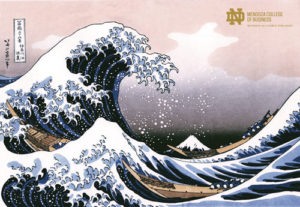 Now to our graduates: I have a small gift for all of you and I’m going to spoil any surprise: it’s a print of a famous Japanese work of art called “The Great Wave Off Kanagawa.”
Now to our graduates: I have a small gift for all of you and I’m going to spoil any surprise: it’s a print of a famous Japanese work of art called “The Great Wave Off Kanagawa.”
It’s one of my favorite pieces of art, and more importantly, I think it describes the world you are about to enter.
The University of Notre Dame to some extent is a retreat or oasis. Perhaps not at all times, and certainly there might be those among you who have taken my classes or are remembering tough examinations who may beg to differ.
But overall, you’ve had the privilege of studying on this beautiful campus, learning from fantastic faculty, supported by devoted staff, in a special community of friends in your dorms, classrooms and clubs.
You’ve become part of the Notre Dame family, in what some call the Notre Dame bubble. Now you’re going back into the real world.
What does that look like? Well, something like this.
Quite a wave, no? I’d like you to notice three things about this image.
Let me pause briefly here – and give you a warning: You’re going to hear the number 3 a lot. I like to group things in threes, particularly three things that are interconnected, ordered and form a basic unity, or even a trinity with a small “t.” I can feel my students rolling their eyes. Probably the faculty, too.
Here’s the first set of threes.
The first thing you notice in the image is this big wave – dynamic, challenging and seemingly overwhelming. The wave is a force of nature, and as such it doesn’t care about you or what you are trying to accomplish. That’s how the real world can seem.
Our response to such a wave can also be to see it as an adventure. You can surf on them. Sail on them. And being in a challenging environment can help discipline us, strengthening our character and resolve.
It’s important to remember is that there will always be waves in life. No one gets a guarantee of calm seas all the time.
Now if the waves are that big, you need a compass. Something that tells you where you are going and that you can chart your course by. Something outside of yourselves.
The second thing to notice in the print is exactly such compass, namely Mount Fuji rising in the background. For us, our compass is Our Lord who provides us with a directions for life through the Gospel, the teachings of the Church, and the example of the Saints.
By extension, the liberal arts also help provide a compass, through studying theology, philosophy, social science, humanities and so on — exactly as you have had the privilege of doing in your liberal arts core curriculum.
If the waves are that high, and you are going on the water, you need help. This leads to the third element of this image – the three small mail boats sailing toward a common destination.
Together they form a fleet, interdependent on one another to achieve a common purpose, to arrive at the shared destination.
 This reminds us we are at our best when we recognize that we are part of a community, with a shared purpose, with a responsibility to each other, and in need of help from others.
This reminds us we are at our best when we recognize that we are part of a community, with a shared purpose, with a responsibility to each other, and in need of help from others.
This print presents an analogy of business, helping explain the three shared Ps of business: the shared purpose, the sharing of priorities and the sharing of practice. Mount Fuji gives a sense of direction, representing the need of a compass toward the shared purpose of business, which is to contribute to human flourishing.
Whenever you make a business decision, ask yourself, “Are these goods good, and are these services serving people? Are we considering all of God’s creation and everyone who is affected by our decisions?”
The three ships represent the importance of sharing priorities in business, of cooperation in solidarity — the idea that any business is a social organization with responsibilities to others.
Each individual person in these boats has unique gifts, unique goals and unique circumstances, but is also responsible for all the people in their boat and in the other boats.
Sharing priorities means to make someone else’s priorities your own.
Why would you do that, unless you recognize your shared purpose, which can be as simple as seeing our shared dignity as human persons, made in the image and likeness of God, or unless you recognize that the gifts you received are also meant to benefit others.
The big wave represents the competitive, challenging, dynamic environment of business, where the shared practice of competition disciplines us to grow in excellence and virtue together, competing externally in the marketplace. But more importantly, we are competing internally toward becoming the best version of ourselves.
You can also see the print as a guide to life. We have a shared purpose and are called to live interconnected lives toward ever-closer communion with God and each other.
Our desire to be truly and deeply and everlastingly happy — to flourish — cannot be separated from the flourishing of those around us and having a flourishing personal relationship with God.
Second, we need to share each other’s priorities, so that if something is important to you, it’s important to me. This involves a personal commitment to support each other.
And third, we need to share our practices, growing in virtue and skills together toward the best version of ourselves, which requires God’s grace and the help of others, and so is best done in a supportive community together with others.
What does this mean in a practical sense? How do you actually share a purpose, priorities and practice?
For you to flourish, to have a life that is a force for good, just as Mendoza seeks for business to be a force for good, there are three Cs to pursue with others:
You contribute. You contribute to human flourishing, serving others in response to all the gifts that you have received, through which you flourish yourself.
You cooperate. You cooperate in solidarity through teamwork, as part of a community and prioritizing those with the greatest needs.
You compete. You compete externally in the marketplace, and internally toward the best version of oneself, by the grace of God and with the help of others.
These three Cs reflect our identity as Catholic with both a capital “C,” or informed by our Catholic faith, and with a small “c,” as based on universal, or catholic, values such as the inherent dignity of every person, solidarity toward those with the greatest needs, and our need to develop as persons with freedom for excellence.
This print is a picture of a wave, a mountain and boats. But I hope when you look at it, perhaps even years from now, you will remember our shared purpose, sharing of priorities and shared practice, where our shared compass is best summed up in Matthew 25, when Our Lord Jesus tells us, quote, “What you did for the least among you, you did for me.”
CLOSING
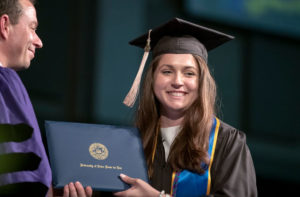 In closing, let me congratulate you again. It has been a great honor to address you today at this celebration, as it has been a privilege for our family to become part of the Notre Dame community myself.
In closing, let me congratulate you again. It has been a great honor to address you today at this celebration, as it has been a privilege for our family to become part of the Notre Dame community myself.
As you leave, I hope you will take up the challenge to commit yourself to the flourishing of others, which our faith proclaims as the way toward our own flourishing. In all you do — in business, in your home and family, in your community, your places of worship — resolve to contribute, cooperate and compete.
And when you face a great wave, remember the words of Isaiah 43:2:
When you pass through the waters, I will be with you;
And through the rivers, they shall not overflow you.
When you walk through the fire, you shall not be burned,
Nor shall the flame consume you.
There will always be waves — natural and otherwise.
But you can take comfort. Because there will always be our unmovable mountain, God, to serve as your destination and point to navigate by.
There will always be our Shepherd, the Lord Jesus Christ, to walk with you.
There will always be the Holy Spirit, to guide and heal you.
There will always be Our Lady, Notre Dame, to protect and intercede for you, and lead you to Her Son.
There will always be people around you who help you on your journey, with love, with compassion and with friendship.
And there will always be the Notre Dame family.
God bless you.
Related Stories

